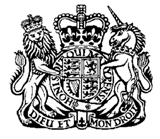
Print Options
Changes over time for: Royal Marriages Act 1772 (repealed)


Timeline of Changes
This timeline shows the different points in time where a change occurred. The dates will coincide with the earliest date on which the change (e.g an insertion, a repeal or a substitution) that was applied came into force. The first date in the timeline will usually be the earliest date when the provision came into force. In some cases the first date is 01/02/1991 (or for Northern Ireland legislation 01/01/2006). This date is our basedate. No versions before this date are available. For further information see the Editorial Practice Guide and Glossary under Help.
Version Superseded: 26/03/2015
Status:
Point in time view as at 01/02/1991.
Changes to legislation:
There are currently no known outstanding effects for the Royal Marriages Act 1772 (repealed).

Changes to Legislation
Revised legislation carried on this site may not be fully up to date. At the current time any known changes or effects made by subsequent legislation have been applied to the text of the legislation you are viewing by the editorial team. Please see ‘Frequently Asked Questions’ for details regarding the timescales for which new effects are identified and recorded on this site.

Royal Marriages Act 1772
1772 CHAPTER 11 12 Geo 3
An Act for the better regulating the future Marriages of the Royal Family.
Most Gracious Sovereign,
Preamble.
Whereas your Majesty, from your paternal affection to your own family, and from your royal concern for the future welfare of your people, and the honour and dignity of your crown was graciously pleased to recommend to your Parliament to take into their serious consideration, whether it might not be wise and expedient to supply the defect of the laws now in being, and by some new provision more effectually to guard the descendants of his late Majesty King George the Second (other than the issue of princesses who have married, or may hereafter marry, into foreign families) from marrying without the approbation of your Majesty, your heirs or successors, first had and obtained, we have taken this weighty matter into our serious consideration; And being sensible that marriages in the royal family are of the highest importance to the state, and that therefore the kings of this realm have ever been entrusted with the care and approbation thereof, and being thoroughly convinced of the wisdom and expediency of what your Majesty has thought fit to recommend upon this occasion;
Modifications etc. (not altering text)
[1.]No descendant of his late Majesty, Geo. 2. (other than the issue of princesses married, or who may marry into foreign families) shall be capable of contracting matrimony without the previous consent of his Majesty, his heirs, &c. signified under the great seal, declared in council, and entered in the Privy Council books.Every Marriage of any such descendant, without such consent, shall be null and void.E+W+S
No descendant of the body of his late Majesty King George the Second, male or female, (other than the issue of princesses who have married, or may hereafter marry into foreign families,) shall be capable of contracting matrimony without the previous consent of his Majesty, his heirs or successors, signified under the great seal, and declared in council (which consent, to preserve the memory thereof, is hereby directed to be set out in the licence and register of marriage, and to be entered in the books of the Privy Council); and that every marriage, or matrimonial contract, of any such descendant, without such consent first had and obtained, shall be null and void to all intents and purposes whatsoever.
2 In case any descendant of Geo. 2. being above 25 years old, shall persist to contract a marriage disapproved of by his Majesty, such descendant, after giving 12 months notice to the Privy Council, may contract such marriage; and the same may be duly solemnized, without the previous consent of his Majesty; and shall be good; except both Houses of Parliament shall declare their disapproval thereof.E+W+S
Provided always that in case any such descendant of the body of his late Majesty King George the Second, being above the age of twenty-five years, shall persist in his or her resolution to contract a marriage disapproved of, or dissented from, by the King, his heirs or successors; that then such descendant, upon giving notice to the King’s Privy Council, which notice is hereby directed to be entered in the books thereof, may, at any time from the expiration of twelve calendar months after such notice given to the Privy Council as aforesaid, contract such marriage; and his or her marriage with the person before proposed and rejected, may be duly soleminized, without the previous consent of his Majesty, his heirs or successors; and such marriage shall be good, as if this Act had never been made, unless both Houses of Parliament shall, before the expiration of the said twelve months, expressly declare their disapprobation of such intended marriage.
3. . . . . . . . . . . . . . . . . . . . . . . . . . . . . . . . E+W+S
Back to top


